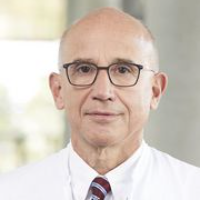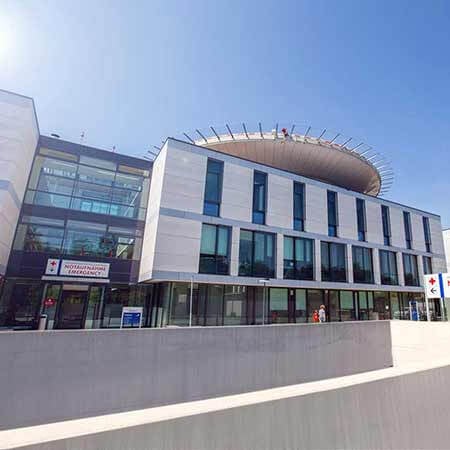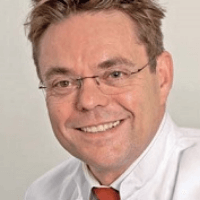Bone Marrow Transplantation in Germany
Here you will find most technologically advanced bone marrow transplantation hospitals in Germany

Department of Hematology, Oncology, Rheumatology, Infectology and Bone Marrow Transplantation
The Department of Hematology, Oncology, Rheumatology, Infectology and Bone Marrow Transplantation offers modern diagnostics and treatment in all areas of its specialization. The medical facility treats patients with solid malignant tumors of various locations, malignant and benign diseases of the hematopoietic system, rheumatic






Department of Hematology and Oncology
The Department of Hematology and Oncology offers the full range of diagnostics and treatment of blood diseases, coagulation disorders, oncological diseases and related pathological conditions. The treatment is provided both on an outpatient and inpatient basis. The patient is offered a comprehensive treatment, includin

Department of Hematology, Oncology, Hemostaseology, Rheumatology and Infectology
The Department of Hematology, Oncology, Hemostaseology, Rheumatology and Infectology offers the full range of medical services in the fields of its specialization. The department specializes in the diagnostics and treatment of all diseases of the hematopoietic system, systemic treatment of solid tumors, infectious diseases, incl





One of the most efficient ways of treating congenital and other forms of immunodeficiency, autoimmune diseases of the nervous system, blood system diseases, and certain types of malignant neoplasms is a bone marrow transplant.
Many patients were given a chance to get rid of those terrible health conditions when conventional medical treatments were ineffective. Transplantation can cure serious diseases and can help to obtain long-term stable remissions.
Why is the bone marrow transplant essential
Blood cells in the body are divided into the three main types: red blood cells that transfer oxygen through the hemoglobin, white blood cells that protect the body from various infections, and finally, platelets that are responsible for blood clotting and bleeding prevention. All of those types of cells are present in the bone marrow. Moreover, you can think of bone marrow as a manufacturer that basically produces the cells. It’s very important for overall health that blood cells function properly.
The functioning of bone marrow itself may be weakened due to the medical treatment of some of the diseases with chemotherapy or radiation therapy. That makes bone marrow transplant essential for general health and wellbeing.
Brief overview of cell therapy in Germany
Bone marrow transplantation is an important therapeutic strategy in the medical treatment of many hematological, oncological, and a number of non-tumor diseases. Currently, over 95,000 transplants are carried out annually in the world, and the number of people who have successfully undergone the bone marrow transplant continues to grow.
Many techniques have been updated for further successful transplantations. Doctors as well learned to determine whether the treatment with a transplant will be beneficial for specific health conditions and certain cancer types.
The procedure itself implies the replacement of non-functioning bone marrow with a healthy one. Usually, a bone marrow stem cell transplant is performed. They have the ability to develop into main blood components such as lymphocytes, leukocytes, erythrocytes, and platelets. German stem cell clinics demonstrate high sucess rates and admit both German citizens and international patients.
Types of bone marrow transplants
The choice of the type of bone marrow transplant is determined by the patient's health condition and medical diagnosis.
There are two main types of bone marrow transplant. The first is the allogeneic bone marrow transplant.
The term "allogeneic" describes a graft obtained from a donor with a different histocompatibility. Meaning that the source of hematopoietic cells is a healthy person who has a genetic similarity to the patient according to certain parameters. The donor can be related or unrelated. The probability of genetic coincidence of the similarity in relatives is usually equaled 25%.
Therefore, in recent years, partially compatible hematopoietic cells from non-relatives donors have been increasingly used. The bone marrow donor medical registry is used for the search of an unrelated donor. The laboratory tests are conducted to determine the compatibility of a donor and a patient. They study HLA tissue compatibility antigens (human leukocyte antigens).
The indications for this type of transplant are:
- Certain forms of chronic leukemia, acute leukemia
- Severe aplastic anemia
- Congenital immunodeficiency states in children
- Recurrent lymphoma after autologous bone marrow transplant
Another type of bone marrow transplant is the autologous bone marrow transplant. The term "autologous" means that transplanted tissue is obtained from the recipient himself.
The success of the transplant depends on the stage of the disease and how aggressive it is, and the patient's general health condition (age, concomitant diseases, functional state of the main organs and systems).
Indications for autologous bone marrow transplant are as follows:
- Hodgkin's and non-Hodgkin's lymphomas (stem cell transplant is performed instead of standard therapy that appears ineffective)
- Multiple myeloma
Acute leukemia is a contradiction for autologous transplantation.
Advantages of each type of transplantation
Advantages of autologous bone marrow transplant are as follows:
- No HLA matching requirement
- No need for immune suppression
The same time, there are several disadvantages:
- No graft-versus-tumor effect
- Possibility of stem cell damage from prior therapy leading to delay in engraftment or MDS
- Possibility of contamination with tumor
Autologous bone marrow transplant is characterized by a lower risk of complications, but a higher risk of relapse.
Advantages of allogeneic bone marrow transplant are:
- Stem cells have not been exposed to chemotherapy
- Stem cells product is free of tumor
- Graft-versus-tumor activity
Disadvantages of this method include:
- Donor availability is uncertain
Allogeneic bone marrow transplant is characterized by a lower risk of relapse, but a higher risk of complications.
How is bone marrow transplantation in Germany carried out?
The first step in decision-making is a study of the medical history of the patient, which will further determine the choice of a medical treatment protocol or the inability of its performance. If the treatment is possible, the patient will be informed of the success rates and theoretical results of the transplant. Once it is agreed upon, the patient has to give written consent to the procedure. This can be considered the starting point of medical treatment.
Next, preparatory studies begin.
In allogeneic bone marrow transplant, for example, the first step is finding a donor. Patients and donors should have matching human leukocyte antigen (HLA). In an autologous bone marrow transplant, this step is skipped as the donor is the patient himself.
Outpatient health examinations that include bone marrow aspiration, chest X-ray, and ECG, are executed within 1 or 2 weeks.
The collected information regulates whether the complete or partial destruction of bone marrow cells is needed. Chemotherapy or radiation therapy is used alone or in combination. The duration of this part of treatment is usually 2-8 days.
This medical treatment will weaken the immune system and therefore will make the patient more vulnerable to infections. It can also cause side effects such as nausea, abdominal pain, fatigue, and loss of appetite. Preventive measures will be taken to minimize discomfort.
After the preparatory regimen, a bone marrow transplant is performed. Regardless of the type or the cell source, the bone marrow will be inserted into the patient's body through a catheter.
Bone marrow is collected right on the day of the transplantation.
Recovery
Successful incorporation of the transplanted bone marrow into the patient's body is called engraftment.
The engraftment is confirmed if the blood cells are actively reproducing. The fact is verified in 10-35 days after the transplantation. Specifically during this period most serious symptoms can occur, which include infections and bleeding.
Thus, the absence or presence of infections or bleeding and uptake of the medication determines the patient's discharge date. The first signs of recovery after engraftment can be seen in about 3 months.
After the engraftment is completed, the healing process begins. The doctor will still monitor a patient's condition for a long time. A patient is usually invited for examination after three months.
During the next consultation with the doctor, the patient will be provided with comprehensive information about the success of the treatment, need for long-term observation, further actions, lifestyle, diet, and physical activity tips.
A doctor prepares an individual long-term follow-up plan for each patient, depending on the degree of immune system recovery, and possible complications.
Patients are also encouraged to use the vaccination treatment services at 12 and 24 months after engraftment.
Psychological aspects and support
After the procedure patients can experience irritability, fatigue, and weakness. Patients often complain of a constant unwillingness to do anything, feeling helpless and dependent on others. The simplest actions suddenly become difficult to do, and it causes irritation.
The isolation during medical treatment creates an atmosphere of loneliness and lack of support. Patients experience alternating improvement and worsening that lead to a feeling of hopelessness.
The treatment of children is especially difficult. Despite the fact that qualified medical personnel uses all possible services to minimize pain, children barely tolerate the technicalities of the treatment and accompanying complications. It is also specifically difficult for children to be isolated, although most hospital departments are designed to recreate a home atmosphere as much as possible.
Outcome
At a superficial glance, the concept of transplantation is perceived as a single standard procedure that either helps or does not help.
However, the outcome of the bone marrow transplant treatment depends on many factors such as the type of transplantation, source of hematopoietic cells, characteristics of the patient and the donor, capabilities, and experience of a particular transplant center, etc.
In spite of the goal of the transplant, it has a great likelihood of treating or putting at remission some diseases. Surely, the main goal is to treat the disease or at least to control the disease, impacting the patient's quality of life.
It's all individual, as patients experience various complications. Therefore, the precise prediction of the success of the treatment before the procedure is very abstract, or rather impossible.
It can be very unsettling to see the obstacles that arise while undergoing the treatment as complex as it is. Nonetheless, it's important to remember that there are many survivors that experienced complications but ended up successfully undergoing the transplant and further recovery.
Where to undergo the procedure
Today, around 100,000 people in the world owe their health and lives to the professionalism of doctors who transplant bone marrow cells. In many countries, there are still no databases and registries of potential bone marrow donors.
The successful practice of German clinicians in bone marrow transplantation goes back several decades. Therefore, clinics for stem cell transplantation in Germany that are presented on the Booking Health portal offer a real chance to defeat the diseases.
As the world’s most transparent medical tourism agency, Booking Health recommends the following hospitals for bone marrow transplant in Germany:
- University Hospital Ulm
- University Hospital Freiburg
- University Hospital Frankfurt am Main
- University Hospital Heidelberg
- University Hospital Wurzburg
To find out whether the cost or the hospital is suitable for you, leave a request on the Booking Health website. We’ll provide you with all the information about specialized hospitals, prices in Germany, available appointments, etc.

